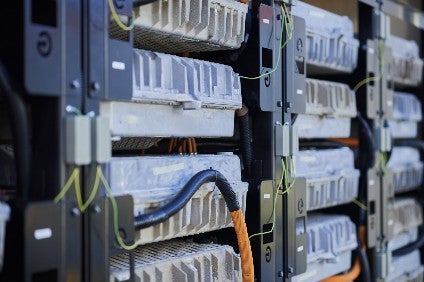
- Renault brings EV experience and battery technology to UKs largest second life sustainable energy project
- Over 1,000 batteries will be used in low impact energy storage systems created by Connected Energy
- Commissioning of first advanced battery storage (ABS) in Douai, France
Renault Group on Wednesday announced two new ‘second life’ EV battery recycling programmes with the SmartHubs Project in West Sussex, here in England, and Advanced Battery Storage in Douai, France, said to be two of the largest projects of their type in Europe.
“The aim is to bridge the gap between electricity consumption and production in order to increase the share of renewable energy, as well as maintaining the balance between supply and demand on the grid by integrating different energy sources with intermittent production capacities,” the automaker said in a statement.

Discover B2B Marketing That Performs
Combine business intelligence and editorial excellence to reach engaged professionals across 36 leading media platforms.
The SmartHubs project, in collaboration with Connected Energy, will recycle 1,000 batteries from Renault EVs which will be used alongside other technology as part of a local energy system to help provide cleaner, lower cost energy for use in social housing, transport, infrastructure, private homes and local business. The batteries will be installed in Connected Energy’s specially designed E-STOR systems.
SmartHubs involves installation of several 360kWh E-STOR systems on industrial and commercial sites, with some linked to solar panels and EV chargers to help sites reduce energy costs and optimise the use of renewable energy.
A large E-STOR cluster system using around 1,000 more batteries to store 14.5MWh of energy will also be installed. This will rapidly charge and discharge to help balance the electricity network and will store enough energy to power 1,695 average British homes for a full day. The SmartHubs project is one of four UK government initiated projects designed to help design the energy systems of the future.
This project is being carried out by a consortium led by Connected Energy with partners Moixa, PassivSystems, ICAX, Newcastle University, West Sussex County Council and Innovate UK.
In Douai, France, the first advanced battery storage (ABS) has just been installed at the Renault Georges Besse plant with a capacity to store 50 MWh across several sites. The storage systems make it possible to regulate and stabilise the network by charging the batteries when demand is low then returning the stored energy back into the network as soon as demand resumes.
ABS uses the so called second life batteries, as well as new batteries, stored for future aftermarket use for a total capacity close to 5MWh. The project has been carried out with Banque des Territoires, Nidec, The Mobility House, Demeter, and the Ecological Transport Modernisation Fund.






